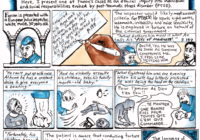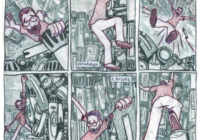Blind Readers and Comics: Reflecting on Comics’ Storytelling from a Different Perspective
Dittmar, J. F. (2019). Blind readers and comics: reflecting on comics’ storytelling from a different perspective. Comics Forum. Retrieved from https://comicsforum.org/2019/08/04/blind-readers-and-comics/ ABSTRACT: This paper discusses comics for the blind, based on the example of the tactile comic life by Philipp Meyer and Astérix par Touchtatis ! by Olivier Poncer. It looks into the potential and the restrictions of sequential pictorial… Read More »

